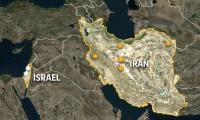Urgent climate action
In view of the current global environmental turmoil and the intermittent El-Nino effect culminating into unexpected climate change to which Pakistan only adds one per cent carbon into the ozone layer, developing countries like ours are badly suffering.
It has become extremely important to take this seriously for our very survival. While the Paris Agreement and Kyoto Protocol are in place at the policy level, they may take decades to be fully implemented for real effect. Even if these are made mandatory for all the countries, the ozone layer may take about half a century to repair itself.
Additionally, this global warming and climate change is causing premature melting in the glaciers in the northern mountains of Pakistan, resulting in excessive flows of water now and little water after about 30 years. Drought, heatwaves and uncontrolled forest fires at a massive scale, tidal waves, cyclones etc, are being experienced in Canada, US, Europe, China, the India-Pakistan region and even the Far East to some extent. The catastrophic effects of snow melt in Antarctica are already being studied.
In the meantime, what can we do in Pakistan to mitigate the adverse effects of major disasters like floods, untimely rain with hailstorms, cloud bursts which badly damage our crops and property, and infrastructure? A clear example of the devastation is how some of our most productive land in Sindh is still under water after the floods of last year. These floods also badly affected southern Punjab, and parts of Khyber Pakhtunkhwa including Chitral. More than three million people were badly affected by these rains and floods.
We must therefore act now and immediately. We cannot afford to wait for the implementation of international agreements. By mobilizing public opinion, the government can take practical steps like construction of large and small dams, dykes to divert and store flood water, raising heights of embankments and bridges for roads, railways or even their realignments, improvement of cross-drainage structures in clearly identified vulnerable areas by aerial and ground surveys, and shifting of villages to higher ground.
For all this, to start with, a master plan is needed, to be prepared under the supervision of the Planning Division along with estimates and sound designs by a competent, experienced, and reliable consulting firm. The execution can be phased out for completion within the next 3-5 years, depending upon the availability of resources, by various agencies like Wapda, Railways, provincial irrigation departments and the National Highway Authority.
We also need to develop new varieties of crops like wheat, cotton, corn, and rice etc that can grow in standing water, excessive rainfall and drought conditions. These projects will generate more income, reduce unemployment and poverty, bring about overall prosperity and give a new direction and hope to our people. This model can later be replicated by other developing countries after due modifications
To implement all the mega projects beyond our capability and capacity, heavy sustainable and consistent funding will be needed. On our part, we should not only carry out necessary surveys and research with the help of new technologies, and make a modest start through our own affordable budgetary provisions, but also try and raise the interest of foreign aid agencies – especially the World Bank whose Country Climate and Development Report (CCDR) for Pakistan and that of Martin Raiser of the World Bank emphasise urgent action to prevent further devastation to the people of Pakistan and its economy.
Friendly countries like China, the US, Saudi Arabia, UAE and Qatar could also be persuaded to become our joint partners in these projects. It is not only the moral duty of developed countries to do so but will also give them a better rate of return on their investments (ROI) by improving our communication and transportation network which will facilitate free trade, and transportation of goods from Central Asian countries, China, Middle East, to the West, and from West to the East and North.
For Pakistan, this is an alarming situation which requires political stability and continuation of policies. The army could be requested to monitor these projects to prevent misappropriation of funds, and ensure timely completion.
The writer is a former engineer-in-chief, and founding rector of the National University of Sciences & Technology (NUST).
-
 Nvidia’s New Specialized Chip Aims To Accelerate AI Processing Speeds
Nvidia’s New Specialized Chip Aims To Accelerate AI Processing Speeds -
 Demi Moore Was Left With ‘intense’ Illness After ‘The Substance’
Demi Moore Was Left With ‘intense’ Illness After ‘The Substance’ -
 How AI Can Read Your Thoughts Without You Speaking?
How AI Can Read Your Thoughts Without You Speaking? -
 Elon Musk’s Grok Faces Scrutiny From Federal Agencies Amid Pentagon-Anthropic Standoff–Here’s Why
Elon Musk’s Grok Faces Scrutiny From Federal Agencies Amid Pentagon-Anthropic Standoff–Here’s Why -
 ‘I Saw Nothing’: Bill Clinton Denies Knowledge Of Epstein’s Crimes In House Testimony
‘I Saw Nothing’: Bill Clinton Denies Knowledge Of Epstein’s Crimes In House Testimony -
 Jim Carrey Makes Surprising Confession About Rarely Seen Girlfriend Min Ah
Jim Carrey Makes Surprising Confession About Rarely Seen Girlfriend Min Ah -
 How Michael J. Fox Helped Harrison Ford With His Parkinson's Monologue
How Michael J. Fox Helped Harrison Ford With His Parkinson's Monologue -
 AI Safety Battle: Anthropic Fires Back At Pentagon After US Military Flags It ‘supply Chain Risk’
AI Safety Battle: Anthropic Fires Back At Pentagon After US Military Flags It ‘supply Chain Risk’ -
 OKC Vs Nuggets: NBA MVP Shai Gilgeous-Alexander Scores 36 In Fiery Overtime Win
OKC Vs Nuggets: NBA MVP Shai Gilgeous-Alexander Scores 36 In Fiery Overtime Win -
 Eric Dane's Biggest Regret Comes To Light Following Days Of His Death
Eric Dane's Biggest Regret Comes To Light Following Days Of His Death -
 Israel Launches Attack On Iran's Capital And Declares State Of Emergency
Israel Launches Attack On Iran's Capital And Declares State Of Emergency -
 At Least 15 Dead After Military Plane Carrying New Banknotes Plunges Out Of Control In Bolivia
At Least 15 Dead After Military Plane Carrying New Banknotes Plunges Out Of Control In Bolivia -
 OpenAI Partners With Pentagon After Trump Bans Anthropic AI
OpenAI Partners With Pentagon After Trump Bans Anthropic AI -
 Trump Orders Federal Agencies To Stop Using Anthropic AI Tools
Trump Orders Federal Agencies To Stop Using Anthropic AI Tools -
 Shocking Details Emerge In Martin Short’s Daughter Katherine's Death Investigation: 'Kept To Herself'
Shocking Details Emerge In Martin Short’s Daughter Katherine's Death Investigation: 'Kept To Herself' -
 Daniel Serafini Gets Life Without Parole In In-laws Murder And Attempted Murder Case
Daniel Serafini Gets Life Without Parole In In-laws Murder And Attempted Murder Case



